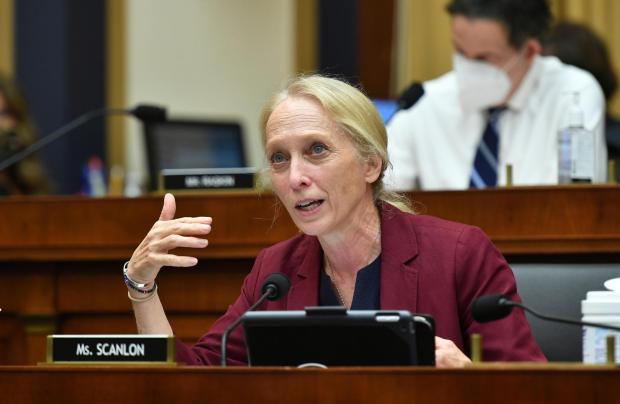U.S. Rep. Mary Gay Scanlon, D-5 of Swarthmore, recently violated the Stop Trading on Congressional Knowledge Act of 2012 by filing a late financial disclosure form revealing her husband sold five stocks in 2021 worth up to $110,000, though she has attributed it to a mistake made by her financial advisor.
Scanlon’s husband, Mark Stewart, sold four stocks Feb. 12 worth up to $95,000 and another Feb. 1 worth up to $15,000, according to a disclosure filed Aug. 12. Congress members do not have to provide exact figures for such transactions, only a range of the values.
The STOCK Act requires all such transactions made by lawmakers or their spouses to be recorded within 45 days or pay a late fee. In this case, Scanlon spokesperson Carina Figliuzzi said Scanlon paid the lowest fee of $200 for a first-time infraction.
“In preparing her most recent financial disclosure report, Rep. Scanlon discovered that certain transactions in her husband’s retirement account, which is managed by a financial advisor who has discretion over the account, had not been reported in a previous filing,” said Figliuzzi. “Rep. Scanlon was unaware of these transactions and took immediate action to report them, pay the $200 late fee, and implement additional procedures to ensure that such transactions will not be overlooked in the future.”

Figliuzzi said Scanlon herself does not trade individual stocks and is an original cosponsor of the Ban Conflicted Trading Act, which would prohibit lawmakers and certain staff members from holding or trading individual stocks except through a blind trust.
That bill, introduced by U.S. Rep. Raja Krishnamoorthi in March 2021, has sat dormant before the Subcommittee on Commodity Exchanges, Energy, and Credit since April 29, 2021, according to Congress.gov. Scanlon was one of 14 original members to co-sponsor the legislation.
Business Insider, which broke this story last week, has been investigating STOCK Act violations and has so far determined 69 members and at least 182 senior congressional staffers filed late disclosures just since 2021. The publication has also noted that the Act is largely toothless, with little to no transparency and a virtually nonexistent enforcement mechanism.
David Galluch, Scanlon’s Republican opponent in the 2022 midterm election, was quick to condemn the violation along with Scanlon’s recent vote for the Inflation Reduction Act, noting the independent Congressional Budget Office has found it will have a negligible impact on inflation in 2022 and likely not much of an impact next year either.
Galluch additionally took aim at the amount traded – potentially $33,000 more than the average household income of about $87,000 by U.S. Census Bureau figures – and Scanlon’s explanation that it was the fault of a financial advisor.
“The buck stops with Congresswoman Scanlon, whether a financial advisor made an error or not,” he said is a statement. “Members are ultimately responsible for disclosing their trades and those of their spouses. The light fine, slap on the wrist, and attempt to shift blame underscores what I’ve heard tens of thousands of people tell me: ‘I feel like there are two sets of rules and consequences — one for those in power and another for the rest of us.’ Unfortunately, this lends credence to their claim — rules for thee but not for Mary G.”
The candidates are aligned, however, in their support for both the Ban Conflicted Trading Act and TRUST in Congress Act, which would require lawmakers and their immediate family members to place any individual stocks in a blind trust that could not be ended until at least six months after they leave office.
The 2022 General Election is Nov. 8.








